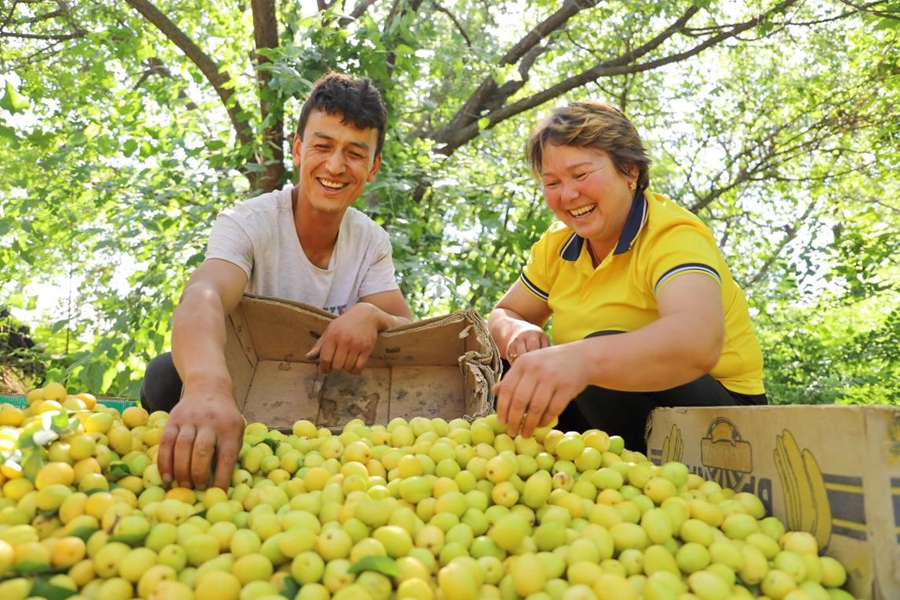‘Pairing assistance’ program in China introduces fruits from Xinjiang to rest of the country
 |
| Photo taken on June 24, 2021, shows villagers of Yingtuer village, Wuzun township, Kuqa city, northwest China’s Xinjiang Uygur autonomous region, sorting apricots. (People’s Daily Online/Wu Le) |
In midsummer as northwest China’s Xinjiang Uygur autonomous region is filled with fragrances from various kinds of ripe fruits, a steady stream of trucks fully loaded with fresh fruits leave major logistics centers in the region for buyers across the country.
Limited by long transport distances and poor logistics, Xinjiang had difficulty introducing forest products and fruits to other regions of China. Fortunately, many Chinese provinces and cities have given full play to their respective advantages of markets and resources to help the region sell its characteristic agricultural products through online and offline channels under China’s “pairing assistance” program in which they have paired up with Xinjiang to assist it with development.
While helping sell forest products and fruits of Xinjiang, these provinces and municipalities have facilitated the agricultural structure adjustment and increased the income of farmers and herdsmen in the region.
Fruit grower Maimaijiang Abudureheman in Hongqipo Farm, Aksu city, Aksu prefecture of Xinjiang, who used to feel anxious about the sale of his fruits during harvest season, now see buyers come to his orchard when fruits are still on the branches.
In July 2020, Abudureheman signed a contract with a local agriculture company to have all the fruits produced in his orchard purchased by the company and then sold in cities across the country via the “ten cities, one hundred stores” project jointly launched by Xinjiang and east China’s Zhejiang province.
The project aims to, through multiple cooperation models, build public warehouses in 10 prefecture-level cities in Zhejiang for featured products from Aksu prefecture of Xinjiang and form more than 100 retail outlets for the marketing of these products, according to Chen Haitao, deputy head of the command center of Zhejiang province for providing pairing assistance for Xinjiang.
From the beginning of 2020 to June 2021, Zhejiang province sold 350,000 tons of agricultural products from Aksu prefecture and the 1st division of Xinjiang Production and Construction Corps via online and offline channels of the “ten cities, one hundred stores” project, with the sales volume reaching five billion yuan ($771 million).
In June this year, officials dispatched from Shenzhen city in south China’s Guangdong province to assist Xinjiang’s development hosted a livestreaming show in Amanla village, Awati township, Kashi city, Xinjiang, to sell apricots for the village. Within two hours, the apricots of the village were sold out and the total sales exceeded 60,000 yuan. It was the second consecutive year that these officials hosted livestreaming promotion for local products in Xinjiang.
Besides actively establishing online marketing platforms together with many companies, the command center of Shenzhen for providing pairing assistance for Xinjiang has also set up dedicated counters for agricultural products from Kashi city in gas stations and service areas, and facilitated the entry of agricultural and sideline products from Kashi into the purchasing system of supermarket chains in Shenzhen.
Last year, Shenzhen helped sell 11,600 tons of agricultural products worth of 230 million yuan from Kashi.
Since 2018, the command center of east China’s Shandong province for providing pairing assistance for Xinjiang has implemented an innovative project to reduce poverty in Xinjiang through promoting consumer spending on products from poor areas in the region.
Under the project, more than 100 agricultural product processing and marketing enterprises in Shandong and Xinjiang have been motivated to establish a supply and marketing cooperative alliance, and set up front-end warehouse-based sales platforms for characteristic agricultural and sideline products from Kashi. Products sold on these platforms are purchased directly from their planting bases and transported through a unified logistics system. In addition, these platforms have realized the integration of production, supply, and marketing of these products.
These efforts can lower the transportation costs, reduce intermediate links in and shorten the time needed for the transactions, accelerate the rotation of capital, and facilitate market connection between supply and demand, thus effectively promoting market expanding for high-quality agricultural and sideline products from Kashi, said Zhang Chengwei, head of the command center of Shandong for providing pairing assistance for Xinjiang.
As of the end of last year, a total of five centers had been built in Shandong under the project launched by the command center of Shandong for providing pairing assistance for Xinjiang for the storage, preservation and distribution of agricultural and sideline products from Xinjiang, covering an area of over 11,000 square meters.
In addition, 18 flagship stores and more than 180 franchised outlets selling agricultural and sideline products from Kashi had been established in 16 cities with subordinate districts in Shandong. In this way, an agricultural product marketing network featuring interconnection among planting bases, warehouses, flagship stores, and franchised outlets has taken shape.
Last year, some agricultural and sideline products in Xinjiang encountered poor sales due to impact of the COVID-19 pandemic. To solve the problem, the command centers of Chinese provinces and cities for providing pairing assistance for Xinjiang continuously launched programs to boost the consumption of products from poor areas in Xinjiang. In July and August last year, they helped sell more than 800 million yuan worth of agricultural and sideline products for poor areas of the region.
 |
Photos
Related Stories
- China pools resources to help Xinjiang achieve moderate prosperity
- Kodak apologizes over Instagram post that claims Xinjiang is under ‘a(chǎn)cute repression’
- Reaching towards new developmental heights in a modernizing Xinjiang
- Xinjiang agricultural products reach more markets through pairing assistance
- Chinese netizens criticize Kodak for posting photos of Xinjiang while describing the place as under 'acute repression'
Copyright © 2021 People's Daily Online. All Rights Reserved.










